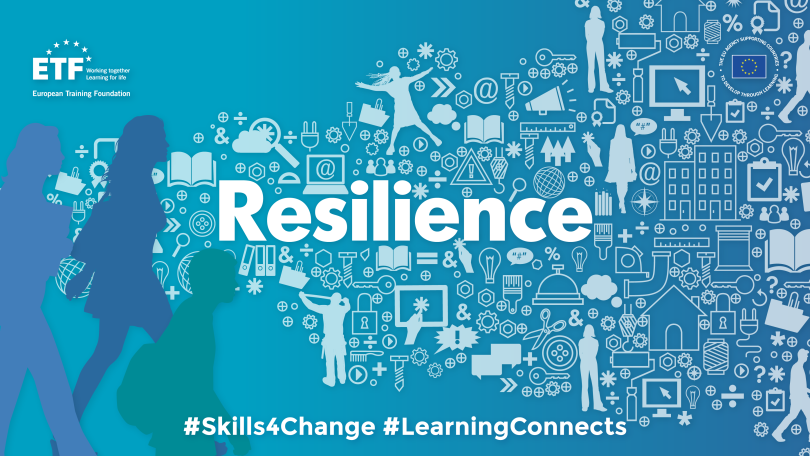
Why focus on 'resilience'?
What is resilience?
Resilience is generally thought of as the capacity to withstand and overcome difficulties. The volatility of recent times wrought by the Covid-19 health crisis, migratory and demographic population shifts, the global financial crisis, and the pressures of the digital and green transitions have seen fostering resilience take greater prominence in EU policy discourse and actions. Attention is given to building resilience at individual, organisational, societal and system, and national levels.
The ETF’s October 2021 campaign focuses on the concept of resilience at each of these levels with reference to the EU’s external relations and the ETF’s supporting actions. Throughout this month on our website and social media channels we will engage in discussions with leading experts on what is being done to boost resilience within education and training and skills development in our partner countries.
What is the EU policy approach to resilience?
Resilience is a multifaceted and interdisciplinary concept and how it is understood determines the approach in the policy process.
The European Union outlines its strategic approach to resilience in its 2017 communication A Strategic Approach to Resilience in the EU's External Action . It builds on an earlier 2012 communication which defines resilience as "the ability of an individual, a household, a community, a country or a region to withstand, adapt and quickly recover from stresses and shocks".
The EU global strategy takes the concept further. It speaks of resilience as "a broad concept encompassing all individuals and the whole of society" that features "democracy, trust in institutions and sustainable development, and the capacity to reform". Support to resilience at all levels is also an integral part of the new European Consensus on Development. It recognises the interlinkages between poverty, conflict, fragility and forced displacement that need to be addressed in a coherent and comprehensive manner.
The overall objective of EU actions is to increase resilience to build, sustain and restore advancement towards inclusive and sustainable development and peace - in the context of political, security, economic, societal and environmental shocks and pressures, including conflict-related risks and impacts.
What is the ETF doing to support resilience?
The ETF contributes to the EU’s specific objectives of:
- improved inclusive, participatory, accountable and representative democratic processes and decision making at all levels;
- increased social cohesion and social inclusion of communities and societies;
- enhanced adaptability, diversification and inclusivity of economic systems; and
- reduced exposure and vulnerability to natural and man-made hazard and disasters, and their underlying structural risk.
In particular, the ETF works on helping countries to develop inclusive lifelong learning systems that support sustainable livelihoods, with a specific attention to economic adaptability and resilience, as well as the inclusion of women, youth and marginalised/vulnerable groups.
The ETF works at understanding the changing skills demand in its partner countries to support them in the transformation of their education and training systems into lifelong learning systems that are responsive to change and challenges as we have seen with the financial and health crises.
We work at each of the following levels, which all interact and potentially reinforce each other:
- individual learner – the development of curriculum approaches, continuous professional development of teachers, career guidance provision, and learning institution readiness;
- business and enterprises - building employee resilience through relevant training and skills development responding to market needs, high level training provision, and engagement in supportive networks;
- societal and system level – policy advice on labour market and employment policies and interventions including upskilling and reskilling and the inclusion of vulnerable individuals and communities, development and implementation of qualifications systems, and support for monitoring and adaptation of policy measures;
- state level – promotion of good governance that includes the participation of civil society in decision making and the strengthening of democratic processes.
Finally, the ETF works at building partnerships for international cooperation with multiple partners: international organisations, national authorities, research community, digital platforms, social partners, civil society and many others to build a resilient ecosystem at national and local levels.
Stay tuned to all media channels this month to find out more!
Did you like this article? If you would like to be notified when new content like this is published, subscribe to receive our email alerts.